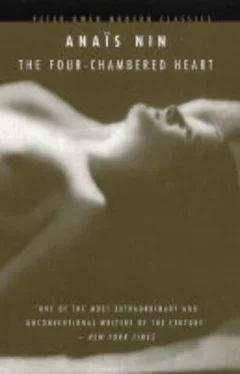Anaïs Nin - The Four-Chambered Heart
Здесь есть возможность читать онлайн «Anaïs Nin - The Four-Chambered Heart» весь текст электронной книги совершенно бесплатно (целиком полную версию без сокращений). В некоторых случаях можно слушать аудио, скачать через торрент в формате fb2 и присутствует краткое содержание. Год выпуска: 2004, ISBN: 2004, Издательство: Peter Owen Limited, Жанр: Классическая проза, Эротические любовные романы, на английском языке. Описание произведения, (предисловие) а так же отзывы посетителей доступны на портале библиотеки ЛибКат.
- Название:The Four-Chambered Heart
- Автор:
- Издательство:Peter Owen Limited
- Жанр:
- Год:2004
- ISBN:9780720611557
- Рейтинг книги:3 / 5. Голосов: 1
-
Избранное:Добавить в избранное
- Отзывы:
-
Ваша оценка:
- 60
- 1
- 2
- 3
- 4
- 5
The Four-Chambered Heart: краткое содержание, описание и аннотация
Предлагаем к чтению аннотацию, описание, краткое содержание или предисловие (зависит от того, что написал сам автор книги «The Four-Chambered Heart»). Если вы не нашли необходимую информацию о книге — напишите в комментариях, мы постараемся отыскать её.
The Four-Chambered Heart — читать онлайн бесплатно полную книгу (весь текст) целиком
Ниже представлен текст книги, разбитый по страницам. Система сохранения места последней прочитанной страницы, позволяет с удобством читать онлайн бесплатно книгу «The Four-Chambered Heart», без необходимости каждый раз заново искать на чём Вы остановились. Поставьте закладку, и сможете в любой момент перейти на страницу, на которой закончили чтение.
Интервал:
Закладка:
That morning at five-thirty she had awakened, gently untangled her body from Rango’s arms and reached her room at six, and at six-thirty her father had knocked on the door because he was ill and wanted care.
(Ali Baba protects the lovers! Gives them the luck of bandits, and no guilt; for love fills certain people and expands them beyond all laws; there is no time, no place for regrets, hesitations, cowardices. Love runs free and reckless; and all the gentle trickeries perpetrated to protect others from its burns—those who are not the lovers but who might be the victims of this love’s expansion—let them be gentle and gay about these trickeries, gentle and gay like Robin Hood, or other games of children; for Anahita, the moon goddess, will then judge and mete out punishment, Mr. Policeman. So wait for her orders, for I am sure you would not understand if I told you my father is delightfully clear and selfish, tender and lying, formal and incurable. He exhausts all the loves given to him. If I did not leave his house at night to warm myself in Rango’s burning hands I would die at my task, arid and barren, sapless, while my father monologues about his past, and I yawn yawn yawn… It’s like looking at family albums, at stamp collections! Understand me, Mr. Policeman, if you can: if that were all I had, I would indeed be in danger of jumping into the Seine, and you would have to take a chill rescuing me. See, I have money for a taxi, I sing a song of thanksgiving to the taxi which nourishes the dream and carries it unbreakable, fragile but unbreakable everywhere. The taxi is the nearest object to a seven-leagued boot, it perpetuates the reverie, my vice, my luxury. Oh, you can, if you wish, arrest me for reverie, vagabondage of the wildest sort, for it is the cell, the mysterious, the padded, the fecund cell in which everything is born; everything that man ever accomplished is born in this little cell…)
The policeman passed by and did not arrest her, so she confided in him and found him rich with knowledge. He knew of many barges here and there. He knew one where they served fried potatoes and red wine to fishermen, another where hobos could spend the night for five cents, one where a woman in trousers carved big statues, another one turned into a swimming pool for boys, another one called the barge of the red lights, for men, and beyond this one there was a barge that had been used by a troupe of actors to travel all through France, and there she might inquire as it was empty and had been deemed unsafe for long voyages…
It was anchored near the bridge, long and wide, with a strong prow from which hung the heavy anchor chain. It had no windows on the side, but a glass trap door on deck which an old watchman threw open for her. She descended a narrow and steep stairway to find herself in a broad room, with light falling from skylight windows, and then there were a smaller room, a hallway, and more small cabins on each side.
The large center room which had been used for the stage was still full of discarded sets and curtains and costumes. The small cabins which branched off on both sides had once been dressing rooms for the ambulant actors. They were now filled with pots of paint, firewood, tools, old sacks, and newspapers. At the prow of the barge was a vast room papered with glossy tarpaper. The skylight windows showed only the sky, but two openings in the wall, working like drawbridges on a chain, were cut only a few inches above water level and focused on the shore.
The watchman occupied one of the small cabins. He wore a beret and dark blue denim blouse like the French peasants.
He explained: “I was the captain of a pleasure yacht once. The yacht blew up and I lost my leg. But I can fetch water for you, and coal and wood. I can pump the water every day. This barge has to be watched for leaks. It’s pretty old, but the wood is strong.”
The walls of the barge curved like the inside of a whale belly. The old beams were stained with marks of former cargoes: wood, sand, stone, and coal.
As Djuna left, the old watchman picked up a piece of wood which held a pail at each end, hanging on a cord. He balanced it on his shoulders like a Japanese water carrier, and began to jump on his one leg after her, keeping a miraculous balance on the large cobblestones.
The winter night came covering the city, dusting the street lamps with fog and smoke so that their light dissolved into an aureole of sainthood.
When Djuna and Rango met, he was sad that he had found nothing to shelter them. Djuna said: “I have something for you to see; if you like it, it might do for us.”
As they walked along the quays, as they passed the station through a street being repaired, she picked up one of the red lanterns left by the repair men, and carried it, all lit, across the bridge. Halay they met the same policeman who had helped her find the barge. Djuna thought: “He will arrest me for stealing a street lantern.”
But the policeman did not stop her. He smiled, knowing where she was going, and merely appraised Rango’s build as they passed.
The old watchman appeared suddenly at the trap door and shouted: “Hey, there! Who goes there? Oh, it’s you, petite madame. Wait. I’ll open for you.” And he threw the trap door fully open.
They descended the turning stairway and Rango smelled the tar with delight. When he saw the room, the shadows, the beams, he exclaimed: “It’s like The Tales of Hoffmann. It’s a dream. It’s a fairy tale.”
Old grandfather of the river, ex-captain of a pleasure yacht, snorted insolently at this remark and went back to his cabin.
“This is what I wanted,” said Rango.
He bent down to enter the very small room at the tip of the barge which was like a small pointed prison with barred windows. The enormous anchor chain hung before the iron bars. The floor had been worn away, rotted with dampness, and they could see through the holes the layer of water which lies at the bottom of every ship, like the possessive fingers of the sea and the river asserting its ownership of the boat.
Rango said: “If ever you’re unfaithful to me, I will lock you up in this room.”
With the tall shadows all around them, the medieval beams cracking above their heads, the lapping water, the mildew at the bottom, the anchor chain’s rusty plaintiveness, Djuna believed his words.
“Djuna, you’re taking me to the bottom of the sea to live, like a real mermaid.”
“I must be a mermaid, Rango. I have no fear of depths and a great fear of shallow living. But you, poor Rango, you’re from the mountain, water is not your element. You won’t be happy.”
“Men from the mountains always dream of the sea, and above all things I love to travel. Where are we sailing now?”
As he said this, another barge passed up the river close to theirs. The whole barge heaved; the large wooden frame cracked like a giant’s bones.
Rango lay down and said: “We’re navigating.”
“We’re out of the world. All the dangers are outside, out in the world.” All the dangers…dangers to the love, they believed as all lovers believe, came from the outside, from the world, never suspecting the seed of death of love might lie within themselves.
“I want to keep you here, Djuna. I would like it if you never left the barge.”
“I wouldn’t mind staying here.”
(If it were not for Zora, Zora awaiting food, awaiting medicines, awaiting Rango to light the fire.)
“Rango, when you kiss me the barge rocks.”
The red lantern threw fitful shadows, feverish red lights, over their faces. He named it the aphrodisiac lamp.
He lighted a fire in the stove. He threw his cigarette into the water. He kissed her feet, untied her shoes, he unrolled her stockings.
They heard something fall into the water.
Читать дальшеИнтервал:
Закладка:
Похожие книги на «The Four-Chambered Heart»
Представляем Вашему вниманию похожие книги на «The Four-Chambered Heart» списком для выбора. Мы отобрали схожую по названию и смыслу литературу в надежде предоставить читателям больше вариантов отыскать новые, интересные, ещё непрочитанные произведения.
Обсуждение, отзывы о книге «The Four-Chambered Heart» и просто собственные мнения читателей. Оставьте ваши комментарии, напишите, что Вы думаете о произведении, его смысле или главных героях. Укажите что конкретно понравилось, а что нет, и почему Вы так считаете.












